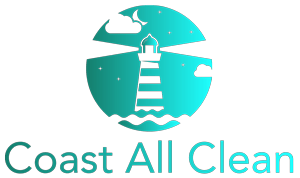When it comes to outdoor cleaning, the terms “pressure washing” and “soft washing” are thrown out a lot. How are the two different, and when is it appropriate to use each one? Here at Coast All Clean, we’ve got answers to these and other questions concerning pressure washing.
Pressure washing involves using high-pressure streams of water to blast away gunk and dirt. With pressure washing, the pressure itself is what performs the cleaning. So, while additional cleaners can be used, they are not always necessary. The need will depend on the surface as well as the type of stain you are dealing with. Pressure washing is ideal for getting into tight nooks and crevices. It is, therefore, perfect for use on porous surfaces such as brick and concrete. If you need to remove chewing gum, tree sap, or other residues, you’ll probably need high water pressure.
While pressure washing is very effective, strong streams of water can nonetheless cause damage. Roofs, in particular, are highly susceptible to damage from water pressure. High pressure can remove the protective granules from asphalt shingles and can even loosen the shingles themselves. Soft lumber or wood with existing decay may not be able to withstand high water pressure either. Some other surfaces that should not be pressure washed include vehicles, stained wood, windows, and gutters.
We avoid pressure washing when cement is deteriorating, or masonry has crumbling mortar, so we’ll use a soft washing technique instead. Pressure washing in those instances may cause further damage. Before pressure washing brick, we’ll perform an inspection to check for holes or cracks that need to be patched first. They can allow water to seep behind your walls and cause significant damage. Soft washing is recommended whenever water pressure damage is an issue. Soft washing involves a much lower water pressure, along with chemicals such as algaecides or surfactants to help eliminate stains. The cleaning products work to loosen stains and make them easy to wash away.
Living here in Myrtle Beach, your vehicle can be exposed to salt damage, which can accelerate the corrosion process. Fortunately, most cars, including their engine components, can be safely cleaned using soft washing. The technique is ideal for wood fences, picnic tables, patio furniture, and cement or fiberboard siding. Plaster and stucco surfaces are best cleaned using a soft washing technique as well.
Just because soft washing is effective that does not mean it is ideal for every occasion. Sometimes, the amount of water pressure isn’t sufficient to get the job done. This could easily be the case if your surface has significant grime or has been the target of graffiti. If you are not sure whether pressure washing or soft washing is best, our experienced technicians would be happy to advise you. Regardless of the method you choose, the professionals here at Coast All Clean can help you restore nearly any surface to like-new condition. Contact us today to receive an estimate and learn more about the different pressure washing options.
All Rights Reserved | Coast All Clean, LLC

